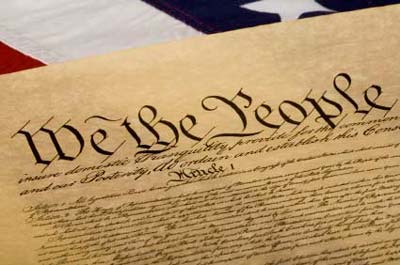 Our
Constitution is no longer respected as it once was. Nations writing new
constitutions don’t see it as the prototype to be followed. All have
something in common with our president.
Our
Constitution is no longer respected as it once was. Nations writing new
constitutions don’t see it as the prototype to be followed. All have
something in common with our president.A study to be published in June in the New York University Law Review finds that our Constitution “appears to be losing its appeal as a model for constitutional drafters elsewhere.”
“Among the world’s democracies,” writes David Law of Washington University in St. Louis and Mila Versteeg of the University of Virginia, “constitutional similarity to the United States has clearly gone into free fall.
“Over the 1960s and 1970s, democratic constitutions as a whole became more similar to the U.S. Constitution, only to reverse course in the 1980s and 1990s.”
The New York Times’ coverage of this study finds “lots of possible reasons” for the decline. The U.S. Constitution,” it says, “is terse and old” and “guarantees relatively few rights.”
“The commitment of some members of the Supreme Court to interpreting the Constitution according to its original meaning in the 18th century may send the signal that it is of little current use to, say, a new African nation,” says the Times.
“And the Constitution’s waning influence” the Times adds, “may be part of a general decline in American power and prestige.”
The Constitution doesn’t seem to be of much use to Barack Obama, either. The president who also thinks U.S. power and prestige are no longer what they were, and aren’t that important anyway, recently lamented that the Founders “designed a system that makes it more difficult to bring about change than I would like sometimes.”
Obviously the framers failed to carve out enough power for the “I” branch of the government to suit him.
A lack of respect for the Constitution isn’t peculiar to Obama. It’s shared among Democrats, in particular, even Democrat-appointed Supreme Court jurists.
Ruth Bader Ginsburg, a Clinton appointee, said last week on Egyptian television that if she were drafting a constitution in the year 2012, she wouldn’t look to ours.
She reportedly recommended the South African Constitution, the Canadian Charter of Rights and Freedoms or the European Convention on Human Rights.
These documents are awash in enumerated rights, but enumerated rights are not the gold standard. Roger Pilon, constitutional scholar at the Cato Institute, contends the more important characteristic of a nation’s founding charter is how it limits government.
“The framers protected rights mainly by limiting power,” he said. “That’s why they didn’t think a bill of rights was even needed.”
A look at the constitutions recommended by Ginsburg reveals that some of the “rights” they secure aren’t in fact natural rights at all but licenses to plunder. The “right” to food or health care can be provided only when someone else’s right to the fruits of his labor or the use of his property has to be violated.
We’re not ashamed to declare the U.S. Constitution a magnificent document that, along with the Declaration of Independence, forms the greatest national charter in human history.
No other document has ever guarded freedom the way it has, and no other contract has provided such a foundation for prosperity. It’s not perfect, but it’s as close to perfect as man has come.
Source: Investors.com
No comments:
Post a Comment